Preface from Michael R Bloomberg, UN Secretary-General’s Special Envoy for Climate Ambition and Solutions:
“At Bloomberg Philanthropies, data informs every aspect of our work to save and improve lives, and we focus on addressing unmet needs that haven’t received the attention they deserve. Global air pollution is a striking example. Millions of people die from air pollution every year, but as the Clean Air Fund’s The State of Global Air Quality Funding 2021 report makes clear, the issue is all too often overlooked and ignored – with tragic consequences. In addition, the same causes driving air pollution are also driving climate change, and by taking them on we can save lives, protect the environment, and benefit the global economy. Bloomberg Philanthropies works closely with cities around the world to improve air quality, including by launching localized monitoring systems, and even more progress is possible in partnership with governments, the private sector, and civil society. We’re glad to support the Clean Air Fund in their work toward that goal, and a future that is healthier and more sustainable for all.”
Read the State of Global Air Quality Funding 2021
A forgotten funding issue
Air pollution is a public health and planetary emergency. Dirty air leaves millions suffering from acute and chronic diseases, affects people’s mental development and general wellbeing, and causes 4.2 million early deaths every year. Action on air pollution is crucial in the fight against climate change. But the recent IPCC report noted that even if we reduce greenhouse gas emissions significantly in the coming years, air pollution will still exceed the guidelines recommended by the World Health Organization.
You would expect that given the scale of the problem, outdoor air pollution would be a priority for development funders and philanthropic foundations. But you’d be wrong.
Time and again, air pollution appears to be a forgotten issue: overlooked and underfunded. Clean Air Fund’s State of Global Air Quality Funding 2021 report – the only global snapshot of projects tackling air pollution – shows that air quality spending is a drop in the ocean of funders’ budgets.
Less than 1% of official development funding is spent on air quality
Official development funding for air quality is dominated by loans to high-growth middle income countries, often for large-scale projects in countries like China. But the total is still less than 1% of overall development funding.
Worryingly, spending is not rising rapidly enough to improve lives, let alone save them. Air pollution related deaths in aid-recipient countries are at an all-time high, now accounting for 90% of all global deaths attributable to the problem. Whilst lots of the funding is rightly directed to countries who bear the highest burden, many hotspots are overlooked. Latin America and Africa received just 10% and 5% of funding respectively, despite being home to significantly polluted areas. For example, Nigeria received just $250,000 in air quality funding between 2015 and 2020, but experienced 70,000 deaths related to air pollution in 2019 alone. With Lagos predicted to become the world’s largest city by 2100, a sharp and swift uptick in funding is needed to support transition away from fossil fuel industrialisation to low carbon development to improve and save lives.
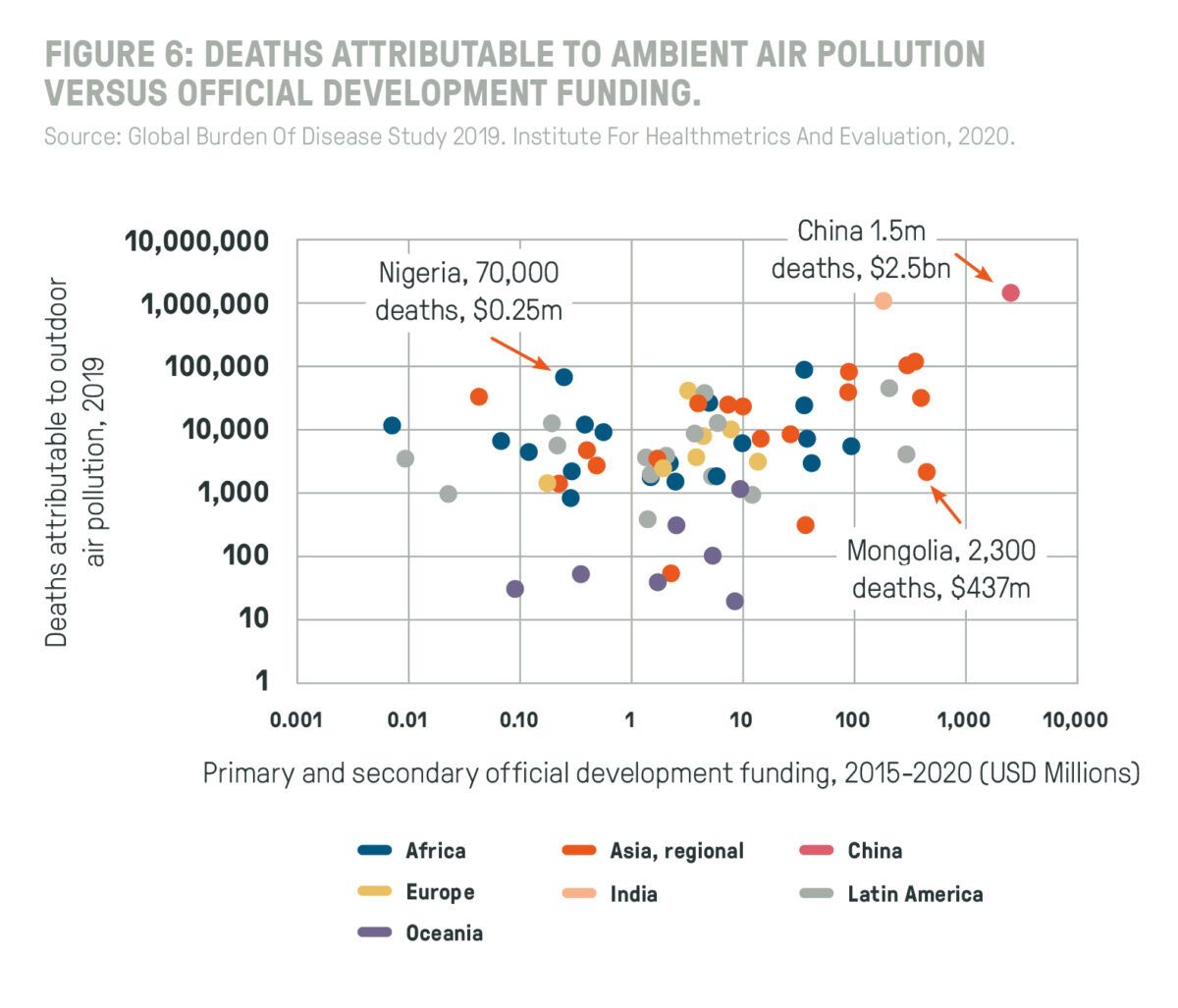
Unfortunately, some development funders are actively making air pollution worse. In 2019 and 2020 development funders spent 21% more aid money on projects prolonging the use of fossil fuels than they spent on projects to improve air quality. With fossil-fuel burning sitting at the destructive nexus between human health and climate change, development funders are exacerbating the very issue they should be tackling.
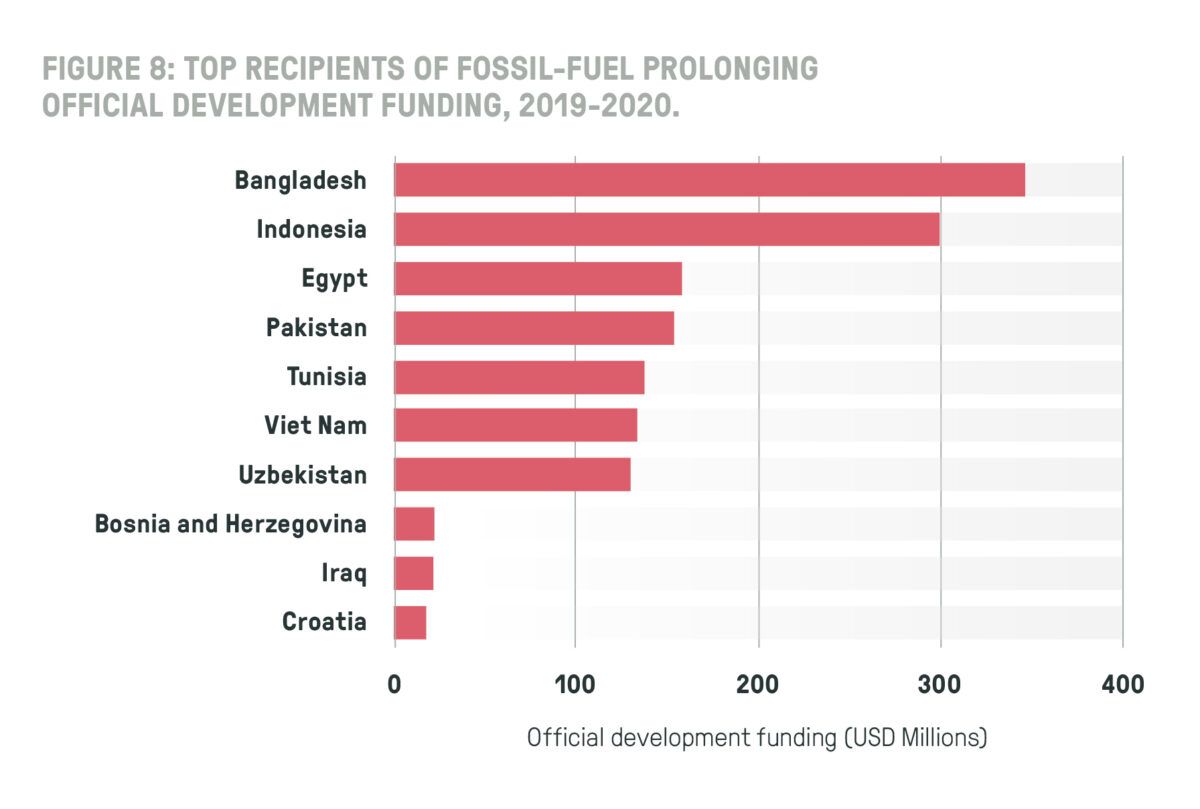
Less than 0.1% of philanthropic foundation funding is spent on air quality
Whilst philanthropic funding for air quality has risen since 2015, it still makes up less than 0.1% of the total. At this rate, annual philanthropic funding for air quality will not surpass $100m for another eight years. Though more grantee organisations are working on air quality now than in 2015, the number of foundations funding them has stayed static. The issue of air quality needs a diverse range of foundations to accelerate the step-change required to match the scale of the problem.
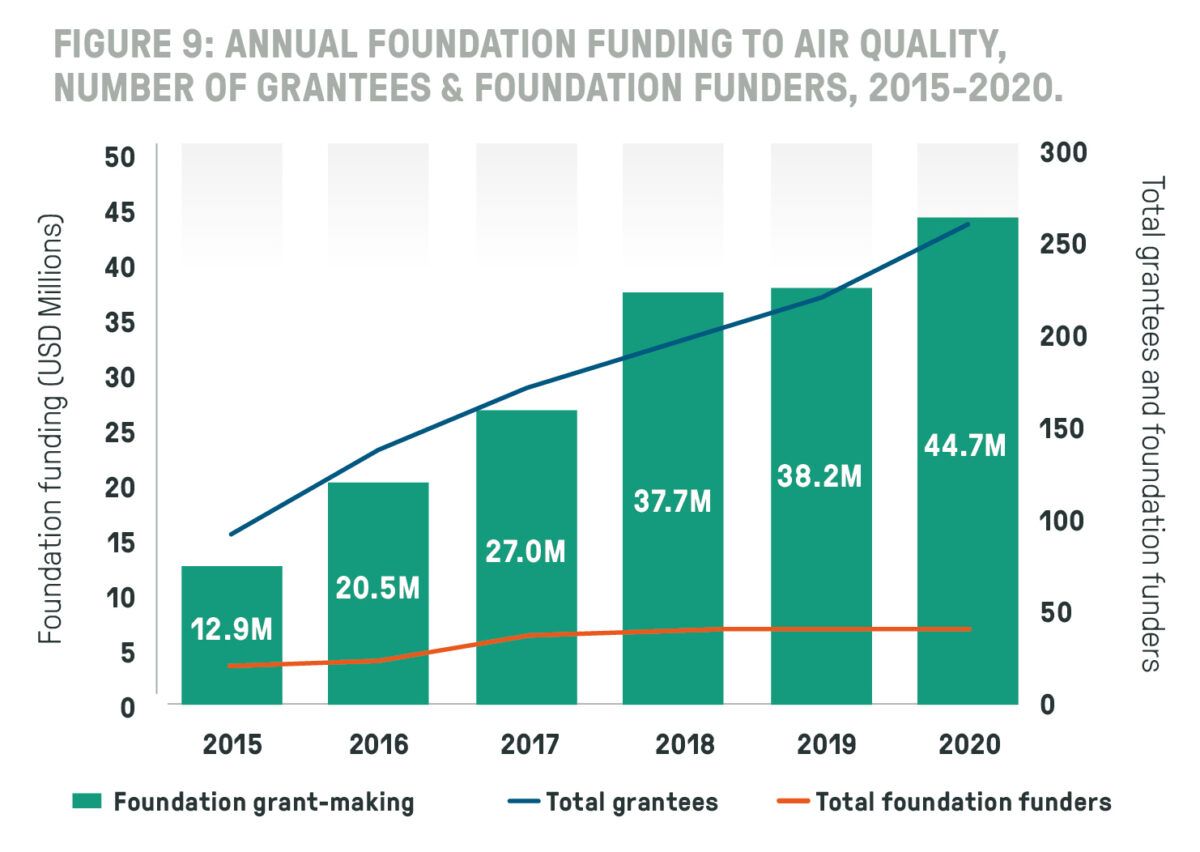
Despite air pollution’s widespread and devastating impact on human wellbeing, health foundations are largely absent when it comes to air quality funding. Where they do engage, it is predominantly through a climate lens rather than addressing a public health priority. Two foundations funding the issue from a purely health perspective have increased spending to $2 million between 2015 and 2020, but this remains a minute amount compared to the needs.
As with development funding, African and Latin American countries, as well as many Asian countries, are overlooked in foundation giving. Despite a combined population of 3.8 billion people, and a combined annual mortality of 1.37 million, they receive less than 4% of total air quality funding from foundations.
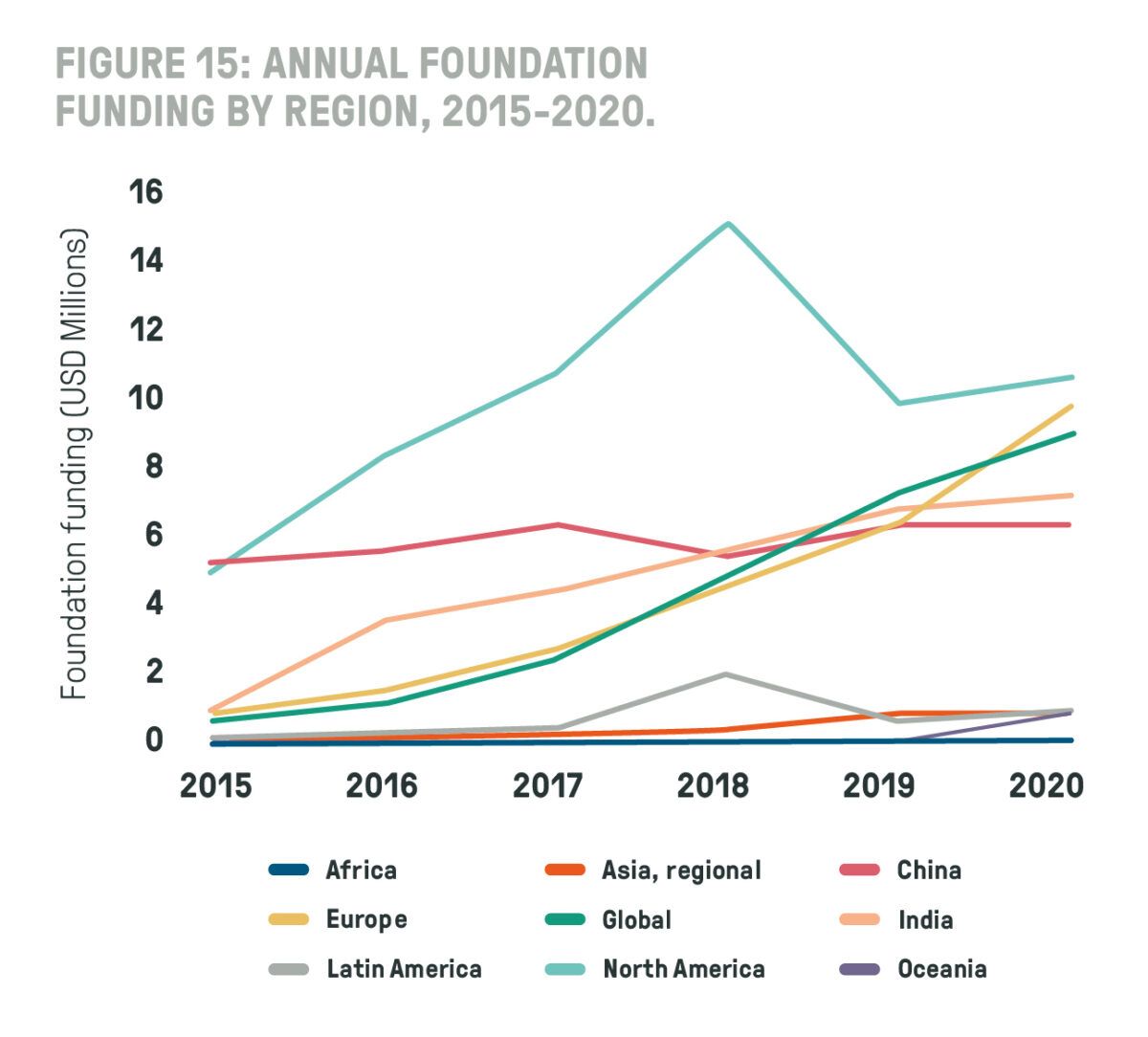
Excitingly, funding for air quality data projects is rising at the fastest rate every year, reflecting the need to build up reliable and accessible data as a foundation for action on clean air. But the countries with the least existing air quality data still receive the least funding, with the growth dominated by grants in North America, Europe and India. Africa on the other hand received merely $40,000 in funding for air quality data between 2015 and 2020 and have just 42 reference-grade monitors for PM2.5, but had 390,000 deaths attributable to air pollution in 2019 alone.
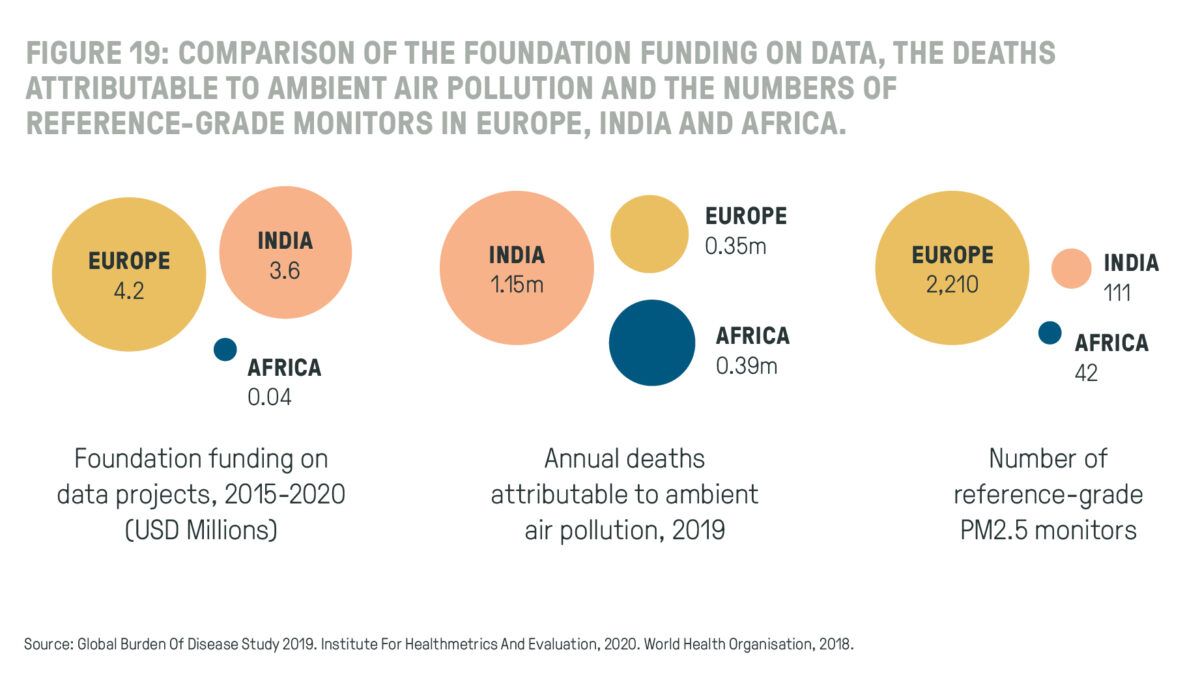
Sufficient and smart funding is needed to deliver clean air
With funding levels so low, and existing funding overlooking countries that need it most, The State of Global Air Quality Funding 2021 report calls for more intentional, strategic and targeted funding for air quality to protect people’s health, mitigate climate change and address inequalities. From recommending increased grant-funding to low-income countries, to stopping all new fossil fuel investments, the recommendations provide a clear way forward for funders to deliver clean air for all.